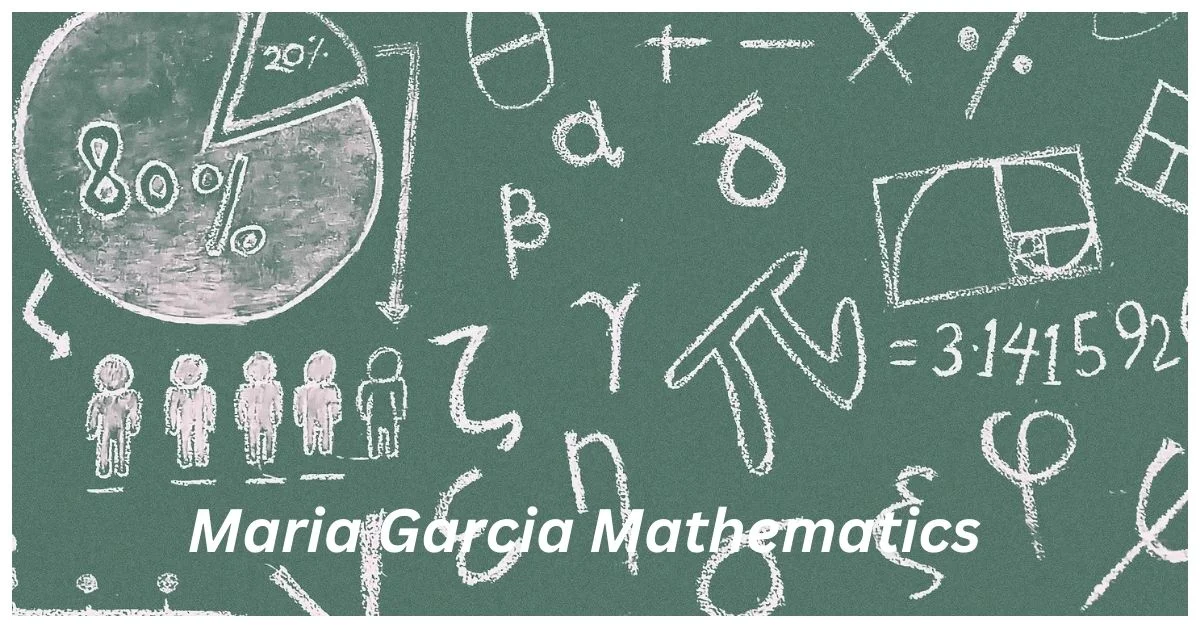Mathematics, often seen as a daunting and abstract subject, can also be an exciting and transformative field of study. For Maria Garcia, mathematics is not just a career; it is a lifelong passion that drives her both personally and professionally. Her story exemplifies the journey of someone who, fueled by an innate curiosity and love for numbers, transforms their passion into a mission: to make mathematics accessible and engaging for all students.
Early Beginnings and Academic Foundation
Maria Garcia’s mathematics journey into the world of mathematics began at a young age, marked by her deep fascination with numbers and problem-solving. Growing up, she was always the student who found joy in puzzles, equations, and patterns. This early affinity for mathematics laid the foundation for a future that would ultimately intertwine her love for numbers with her desire to help others learn and succeed.
Maria pursued her academic aspirations by enrolling at Fresno State University, where she chose to major in Maths. From the start, she excelled in her coursework, impressing her professors and peers with her sharp analytical mind and dedication to mastering complex mathematical concepts. In 2008, Maria graduated with a Bachelor of Arts in Mathematics, achieving a commendable 3.5 GPA. Her time at Fresno State was formative, not only for her technical expertise in mathematics but also for her growing desire to share this knowledge with others.
Discovering a Love for Teaching
Although Maria’s early career trajectory did not immediately point to education, her academic experiences at Fresno State had a profound impact on her views regarding teaching. During her undergraduate years, Maria was often the go-to person in study groups and tutoring sessions. She discovered that helping her peers understand difficult concepts was not just rewarding but fulfilling. Her passion for mathematics was matched by a deep desire to help others overcome their struggles with the subject.
Despite the promise of a traditional career in mathematics, Maria’s calling remained in education. After graduation, she worked at Del Monte Foods as a Shift Supervisor. While her role at Del Monte provided valuable experience in leadership, process engineering, and quality assurance, it became clear that Maria’s true passion lay elsewhere. The structured environment and challenges of leading a team helped her develop important skills, but her desire to teach and inspire others remained strong.
Transitioning to Education
In 2016, after nearly a decade in the corporate world, Maria made a pivotal decision: she transitioned into teaching. She joined the Fresno Unified School District as a mathematics teacher, a career move that allowed her to align her profession with her passion. The decision to become an educator was not taken lightly; Maria had a deep commitment to making a positive impact on the lives of young learners. She understood that maths was not just about solving equations but about developing critical thinking, problem-solving skills, and resilience.
Maria’s shift from the corporate world to the classroom was marked by a new set of challenges. As a teacher, she had to learn how to create engaging lessons, develop curricula, and manage a diverse classroom environment. But Maria embraced these challenges with the same enthusiasm and determination that had driven her academic journey. Her belief that all students have the potential to succeed in mathematics was the guiding principle behind her approach to teaching.
Maria Garcia’s Teaching Philosophy
Maria Garcia’s approach to teaching mathematics is both dynamic and empathetic. She firmly believes that mathematical ability is not an inherent talent possessed by only a select few but a skill that can be developed through effort, perseverance, and the right support. This mindset is at the heart of her philosophy. Maria works tirelessly to build a classroom culture where every student feels valued, capable, and confident in their ability to succeed.
One of the key aspects of Maria’s teaching philosophy is the idea of continuous improvement. She often tells her students that learning is a lifelong process and that there is always room for growth, whether you are solving algebraic equations or teaching others how to solve them. This mindset extends not only to her students but also to herself as an educator. Maria is deeply committed to self-improvement and has consistently sought out professional development opportunities to refine her teaching methods.
Breaking Down Barriers in Mathematics
Maria’s classroom is a space where students feel safe to make mistakes and learn from them. She encourages a growth mindset, emphasizing that failure is an essential part of the learning process. This philosophy is especially important in maths, a subject that many students find intimidating. Maria rejects the idea that only certain students are “naturally good” at math. Instead, she works hard to ensure that all students, regardless of their background or prior experience, are given the tools they need to succeed.
To help her students overcome the anxiety that often accompanies mathematics, Maria incorporates various teaching strategies that cater to diverse learning styles. She uses real-world applications of mathematics to make abstract concepts more relatable, and she often integrates technology to enhance her lessons. Whether through interactive math games, digital simulations, or collaborative group work, Maria makes sure that her students are actively engaged in the learning process.
Another hallmark of Maria’s teaching is her emphasis on data-driven instruction. She regularly assesses her students’ progress, collects data on their performance, and adjusts her teaching methods accordingly. This approach ensures that no student falls behind and that every student receives the personalized support they need to thrive.
Professional Development and Collaboration
In addition to her work in the classroom, Maria is a staunch advocate for professional development and collaboration. She believes that one of the best ways to improve as an educator is to learn from others. Maria actively participates in workshops, conferences, and seminars to stay updated on the latest research and teaching strategies in mathematics education.
She also values the importance of collaborative learning among educators. Maria frequently collaborates with her colleagues in the Fresno Unified School District to exchange ideas, share resources, and discuss challenges. This commitment to collaboration has not only improved her own teaching practices but has also contributed to a more vibrant and effective educational community.
Maria’s dedication to professional development is particularly evident in her work mentoring new teachers. She provides guidance and support to new educators, helping them navigate the complexities of the classroom and instilling in them the same passion for teaching that she has. Through this mentorship, Maria hopes to contribute to a broader transformation in mathematics education, ensuring that future generations of teachers are equipped with the knowledge and skills to inspire their own students.
Looking Toward the Future
Looking ahead, she is committed to continuing her work as a mathematics educator. Her vision for the future is one where all students, regardless of their background or abilities, have access to high-quality mathematics education. Maria is particularly focused on ensuring that students from underrepresented communities have the resources and support they need to succeed.
Maria envisions a future where mathematics is no longer seen as a subject that only a few can master but as a field that is open and accessible to everyone. She hopes to continue refining her teaching methods and exploring new strategies that can help her students thrive in an increasingly complex and data-driven world. Whether through embracing emerging technologies, designing innovative curricula, or fostering a growth-oriented classroom environment, Maria remains committed to making it a subject that all students can enjoy and excel in.
In addition to her work with students, Maria plans to expand her efforts in teacher education and professional development. She hopes to mentor more educators and collaborate with schools and districts to create educational environments where mathematics is taught with passion, rigor, and a deep commitment to student success.
Conclusion
Maria Garcia’s journey from a curious child fascinated by numbers to a dedicated mathematics teacher and mentor is a testament to the power of passion and perseverance. Her unwavering belief that every student can succeed in maths, combined with her commitment to continuous improvement, has made her an invaluable asset to the Fresno Unified School District and the broader educational community.
Through her work, Maria is not only shaping the next generation of mathematicians but also helping to change the narrative around mathematics education. She is proving that with the right guidance, mindset, and support, every student can excel in math—regardless of their starting point. Maria Garcia is a shining example of what it means to be an educator who is dedicated to inspiring others and making a lasting impact.
Frequently Asked Questions (FAQs)
1. What is Maria Garcia’s teaching philosophy?
Maria Garcia believes that all students have the potential to succeed in mathematics, regardless of their natural abilities. She emphasizes a growth mindset and encourages her students to view mistakes as opportunities to learn. Her teaching is centered on continuous improvement, both for herself and her students.
2. What did Maria Garcia study at Fresno State University?
Maria earned a Bachelor of Arts in Mathematics from Fresno State University in 2008, graduating with a GPA of 3.5. Her time at university deepened her understanding of mathematical concepts and fueled her desire to pursue a career in education.
3. Why did Maria Garcia transition from a corporate job to teaching?
While Maria’s role at Del Monte Foods allowed her to develop valuable leadership and problem-solving skills, her true passion remained in education. In 2016, she decided to follow her calling and become a mathematics teacher, believing she could make a significant impact on students’ lives through teaching.
4. How does Maria Garcia make mathematics more accessible to students?
Maria employs a variety of teaching strategies, such as real-world applications, technology integration, and interactive learning activities. She also emphasizes a growth mindset, ensuring that students feel supported and confident in their ability to succeed.
5. What is Maria Garcia’s vision for the future of mathematics education?
Maria envisions a future where all students, regardless of background or ability, have access to high-quality education. She is committed to continually refining her teaching methods and collaborating with other educators to create a more inclusive and dynamic learning environment.
6. How does Maria Garcia support new teachers?
Maria is passionate about mentoring new teachers, offering guidance and support to help them develop the skills and confidence needed to succeed in the classroom. She believes that mentoring the next generation of educators is crucial for improving the overall quality of mathematics education.









